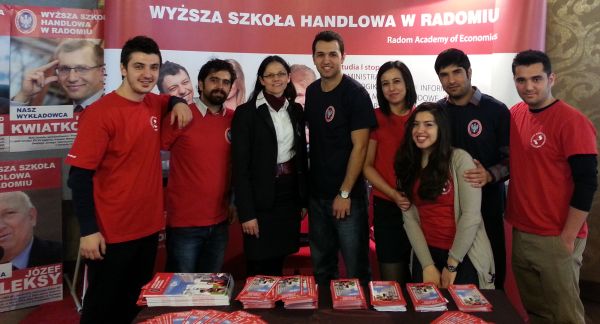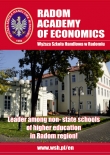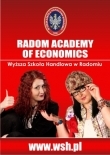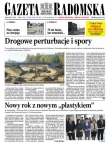 Studies in English
Studies in English
Programmes in English run by Radom Academy of Economics
Radom Academy of Economics has run the International Programme since 2007. The programme and the interdisciplinary English path which was created within it enable the students from the partner universities to study at RAE for one or two terms. The main aim of the English path at Radom Academy of Economics is to help students gain knowledge and skills needed to move freely on the international market level.

Winter term 01.10. 2015 - 31.01.2016
I. LEGAL, ECONOMIC AND SOCIAL ASPECTS OF EUROPEAN INTEGRATION
Courses:
Concept:
The curriculum of the English path was prepared in order to provide students with the necessary knowledge and practical skills in decision-making in diverse conditions of the international market environment. The path realised in this scope is extremely valuable and useful for students because of its interdisciplinary and multi-dimensional approach to analysis of contemporary problems of businesses and economic environment. Currently, many foreign companies and state institutions are in need for specialists in international business that is why, Radom Academy of Economics places an emphasis on the close integration of theoretical and practical knowledge as well as preparation for professional work gained during workshops.
Objectives:
The English Path “International Business in Global Economy” is primarily aimed at providing the students with knowledge and skills needed in doing business internationally and prepare them to work in companies operating in the EU and global economic space. In addition, by taking part in the programme students can acquire knowledge of cultural differences, international relations which enables them to understand the issues of the modern world better, analyze the environment and notice the interconnections among economic units. The programme helps them to learn rules for running businesses, ensuring effectiveness of the market as well as creating and implementing business plans. Students will find out about the functioning of the global and European market, including competition rules, procedures related to the movement of goods across borders. They will also learn how to carry out analyses and evaluate the situation on international markets.

Spring term 01.03.2016 - 30.06.2016 (will be change soon)
II. LEGAL AND SOCIAL ASPECTS OF EUROPEAN INTEGRATION
Courses:
Concept:
The programme will enable students to gain knowledge on international processes during which the individual countries form joint mechanisms and institutions equipped with the powers that were previously in the competence of the state. Integration of the European Union embodies the vision of humanity and a model of society with a special attitude to the rich heritage of values. Members of the European Union as a whole, rather than the sum of components, take the challenge of globalization to have a better impact on economic, social, technological, commercial, political and legal issues. Students will acquire a thorough knowledge of European integration with a focus on social and legal aspects of such a phenomenon as the European Union.
Objectives:
The aim of the programme is to introduce students to the sources of, nature and dynamics of basic legal, social and partially cultural processes related to the European integration. Students will have the opportunity to gain knowledge and assess the European integration in terms of positive and negative legal and social aspects. Our goal is to enable students to gain a general understanding of interdisciplinary social science and to use it at work and in life with the principles of ethics. The main purpose is to enable students to analyze social and political processes taking place in the global, regional, state and local scale, as well as get acquainted with the economic and legal principles underlying the organization and functioning of modern societies. The student should know the history of Europe, the conditions for its integration, as well as the genesis of laws and principles operating in the European Union.
Radom Academy of Economics has run the International Programme since 2007. The programme and the interdisciplinary English path which was created within it enable the students from the partner universities to study at RAE for one or two terms. The main aim of the English path at Radom Academy of Economics is to help students gain knowledge and skills needed to move freely on the international market level.

Winter term 01.10. 2015 - 31.01.2016
I. LEGAL, ECONOMIC AND SOCIAL ASPECTS OF EUROPEAN INTEGRATION
Courses:
- Cultural aspects of international business 5 ECTS
- Human resources management on the international market 5 ECTS
- European law and Democracy in Europe 5 ECTS
- Institutiions and European Union Sources 4 ECTS
- Security Probems in the World and European Union 4 ECTS
- Current trends of international and global Economy 4 ECTS
- Intercultural communication in Europe 4 ECTS
- Economic policy in the European Union 4 ECTS
- International Commercial Law 4 ECTS
- International Marketing 4 ECTS
Concept:
The curriculum of the English path was prepared in order to provide students with the necessary knowledge and practical skills in decision-making in diverse conditions of the international market environment. The path realised in this scope is extremely valuable and useful for students because of its interdisciplinary and multi-dimensional approach to analysis of contemporary problems of businesses and economic environment. Currently, many foreign companies and state institutions are in need for specialists in international business that is why, Radom Academy of Economics places an emphasis on the close integration of theoretical and practical knowledge as well as preparation for professional work gained during workshops.
Objectives:
The English Path “International Business in Global Economy” is primarily aimed at providing the students with knowledge and skills needed in doing business internationally and prepare them to work in companies operating in the EU and global economic space. In addition, by taking part in the programme students can acquire knowledge of cultural differences, international relations which enables them to understand the issues of the modern world better, analyze the environment and notice the interconnections among economic units. The programme helps them to learn rules for running businesses, ensuring effectiveness of the market as well as creating and implementing business plans. Students will find out about the functioning of the global and European market, including competition rules, procedures related to the movement of goods across borders. They will also learn how to carry out analyses and evaluate the situation on international markets.

Spring term 01.03.2016 - 30.06.2016 (will be change soon)
II. LEGAL AND SOCIAL ASPECTS OF EUROPEAN INTEGRATION
Courses:
- Corporate Social Responsibility in the European Union 5 ECTS
- Stereotyping and Prejustice in the European Union 4 ECTS
- Migration in European Union- problem or solution for labour market 4 ECTS
- Regional Policy in the European Union 4 ECTS
- European Law 4 ECTS
- Institutions and European Union Sources 4 ECTS
- Intercultural Communication in Europe 4 ECTS
- The European Union as an Entity of the Global Economy 4 ECTS
- Polish for beginners 4 ECTS
- English 4 ECTS
- Security Problems in the European Union 4 ECTS
- Social aspects of Integration Processes in Europe 5 ECTS
- Democracy in Europe 4 ECTS
- Operating Systems 5 ECTS
- Wireless Networks and Mobile Communication 5 ECTS
Concept:
The programme will enable students to gain knowledge on international processes during which the individual countries form joint mechanisms and institutions equipped with the powers that were previously in the competence of the state. Integration of the European Union embodies the vision of humanity and a model of society with a special attitude to the rich heritage of values. Members of the European Union as a whole, rather than the sum of components, take the challenge of globalization to have a better impact on economic, social, technological, commercial, political and legal issues. Students will acquire a thorough knowledge of European integration with a focus on social and legal aspects of such a phenomenon as the European Union.
Objectives:
The aim of the programme is to introduce students to the sources of, nature and dynamics of basic legal, social and partially cultural processes related to the European integration. Students will have the opportunity to gain knowledge and assess the European integration in terms of positive and negative legal and social aspects. Our goal is to enable students to gain a general understanding of interdisciplinary social science and to use it at work and in life with the principles of ethics. The main purpose is to enable students to analyze social and political processes taking place in the global, regional, state and local scale, as well as get acquainted with the economic and legal principles underlying the organization and functioning of modern societies. The student should know the history of Europe, the conditions for its integration, as well as the genesis of laws and principles operating in the European Union.
















